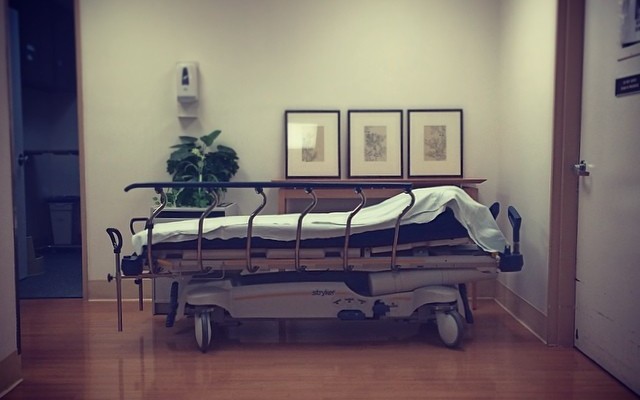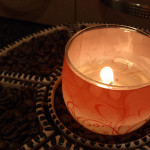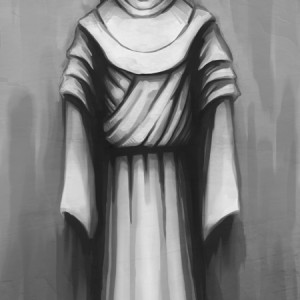Deborah is the first to appear in my apartment. She shows up on my futon, back straight, hands folded in her lap, silently watching me rush about my morning routine. Her brown eyes overflow with tears, small drops trickling down her weathered cheeks to plunk on my hardwood floor. As I struggle into my black pumps, she reaches with leathered fingers to touch the small potted palm sitting on the endtable.
Ignoring her isn’t working. “What are you doing here?”
Her voice is soft and deep, unlike many of the spaced-out women I normally meet. “Is this what you wanted? Is this how you thought your life would be like?”
I hate my voice next to hers. It can be soft and gentle, too, but today my reply croaks from my throat, “I’m fine, thank you very much. It’s none of your business anyway. Now, if you excuse me, I have a job to do.”
“No need to be upset.” God, how calm and self-assured she sounds. “Please, Nikki, have a seat. Listen to what I have to say.”
And I, with my Ph.D. in Social Psychology, snap like some overtired three-year-old, “I don’t want to! Now go away!”
Slamming the door is immature, I know. A couple leaving their own apartment stare as I almost puncture the carpet stomping towards the elevator. I can still feel those eyes of hers: compassionate eyes, full of sorrow. She wants me to open up, to lay my troubles at her feet. But I don’t have time to bare my soul, especially to a woman who’s not supposed to be there.
—
My apartment, I’m proud to say, is painstakingly clean — every article of clothing in its proper place; pots and pans carefully hung over spotless counters; the air fresh with the soft woody scent of pine. My desk at the office, however, is crammed with papers, books, overstuffed folders, knick-knacks. The floor of my pathetic excuse for a cubicle is crowded with boxes, jammed with papers trying to escape their bindings: cases I’ve meant to file away, welfare applications, notes and scribbles from countless bored children sitting in courtrooms. I gave up cleaning my cubicle months ago. Besides, an empty desk often means that a social worker has nothing to do, free to be burdened with even more work. Not that I’ve ever had a chance to enjoy free time.
I’ve placed a bid for a promotion about a month ago. It’s a research position in the suburbs with an office overlooking a pond. It has so much space. There, I would stretch my legs out and breathe deeply. Nothing to clog my thoughts, no one clamoring to grab my attention every moment I’m alone. I would be free to enjoy my profession once more.
But reality intrudes as Tony hands me a bulging manila folder. “I got a surprise for you. David decided that the Owens case was too much for Jackson. Guess who gets to go a-visiting today?”
A paper-strewn desk. A know-it-all supervisor. Grey cubicle walls surrounding me. In my hands, I hold the lives of yet another broken family trying their best to snare the American Dream: a dream soured into a nightmare with every shout, every bruise, every slap in the face. The spacious office with the tranquil view flirts with my mind as I grab my coffee and head out.
—
The dishes in the sink smell. Everything in this dingy house smells. I hold the report on my lap, not wanting to place it on the table splotched with spills of a dubious nature.
The woman sitting opposite of me is supposed to be in her early forties. Sarah’s slouched posture and bloodshot eyes speak of years living on a welfare check, barely getting by in life. She takes a deep drag from her cigarette and gruffly says, “Finished th’ parentin’ classes las’ week.”
“And Samuel?”
“He ain’t comin’ here no mo’.”
“When was the last time you saw him?”
Sarah’s massive shoulders lifts and drops. “Few weeks ago. He jus’ wanted to get his things. Gonna be shackin’ wi’ his girlfriend.” The ash is growing too long to remain on the cigarette. She stares at it but makes no move, watching the dirty grey bar lengthen. “I hear she’s at least sixteen, but I don’ care. You may wanna bust him, anyway. Bastard still owes me money for th’ kids’ stuff.”
“So you’re positive you won’t be seeing him again?” I ask in fake interest.
“He ain’t comin’! Wha’ you wan’ me to do, get a restrainin’ order or somethin’?”
Her eyes drift over the yellowing walls of the kitchen, making me want to shake my head. Beneath that tough exterior was a bone-tired woman aching with the loss of her man. I’d bet my salary that in two weeks she’ll be banging on his door, begging him to come back. I’ve seen it happen so many times with so many women, I can predict the ones ready to break down just by their reluctant, evasive eyes.
Instead, I note her response on my report and ask the question I always know the answer to: “Ms. Owens, do you feel responsible enough for your children to return here under your custody?”
Only then does she look squarely at me, indignant that such a question should come from a fellow black woman like herself. “I raised them kids on my own wi’ no help from him or you. You don’ think I can take care of my own kids? Who feeds them? Who clothes them? Who bore them? I’m th’ only caretaker they got!”
I note that as well and begin rattling off the usual preliminaries. “This will be cleared by the judge on Friday. Your children will be present at the proceedings. During this probationary period, if there is evidence that the children are being neglected again, we will consider that a default and your privileges will be taken away. Do you understand the circumstances of this matter?”
“I ain’t no chile. Course I unnerstan’.” Sarah then notices the spreading stick of ash threatening to engulf her fingers and gives the cigarette a tap. The stick breaks off and falls onto the ashtray, where it breaks apart, sprawled like pieces of a chopped worm. “I unnerstan’, all right.”
—
I return to my apartment to see Deborah deep in conversation with two other women. They sit cross-legged at her feet, almost as if they’re her supplicants, but their casual positions suggest something more friendly, more sisterly. From the moist trails running down their dusky faces, I could see I’m the subject of their talk.
I glare at them. “I thought I told you to leave.”
“We’ve been praying for you, Nikki,” says the woman on the right — Miriam, I’m guessing. She shifts a little and a soft jangling comes from a small tambourine lying against her leg. “We know how difficult your job is. All those broken women — it must be hard to care for them all.”
“There was a time when you did,” says the other woman. I can’t discern who she is. “You worked with them, gave them the confidence to raise their children. You gave them a reason to live again. What happened? When did you stop caring?” She draws her legs up in its spotless white linen robe and wraps her arms around them, making her appear much younger than the other two. Her eyes are puffy and red, as if she has been crying for weeks and weeks.
Her tears don’t move me. I just want to get out of this suit. “It’s just a job. It’s what I’m paid to do. I don’t have to care. I just do it.”
I head for the bedroom, but Deborah’s voice stops me in my tracks. “What would Elizabeth say if she heard you say that?”
The anger flares inside of me so fast my head whirls as I turn to face her. “Don’t you ever, ever, mention that name again!”
I stomp to my bedroom, painfully aware of their watering eyes. I slam the door and lean against it, aghast on hearing that name again. I haven’t thought about her for years. Unbidden, a faint sound rises in my mind, a high-pitched whine that threatens to escalate.
I press my hands to my head. Stop it. Stop it. I refuse to think about it.
The whine fades, but it takes a while before I remove my hands from my head.
—
I pull my car into the driveway of a white and forest-green cottage that could be on the cover of Better Homes and Gardens. The lawn is neatly trimmed, bordered with marigolds and white impatiens. From where I’m parked, I can see into the backyard, where a tire-swing dangles from a branch of a large oak tree. There are no sounds of traffic–only the trill of birdsong and the occasional yell of children somewhere at play. I can’t help but compare it with Sarah Owens’ dingy ranch.
The black woman answering the door is the epitome of every husband’s fantasy: slightly plump, permed hair immaculately in place, wearing an “I’m the cook, that’s why” apron. A gracious smile spreads across her face. “Miss Reynolds, how good it is to see you!”
I nod, playing my role well. “Hello, Mrs. Walkins. I’m here to see the Owens girls. They’re returning to their mother on Friday.”
The smile falters, then perks up as she waves me in. “Oh, of course. How sweet! I’ll go get them.” She begins to climb the staircase, glancing at me over her shoulder. “It’s a shame they’re leaving, though. We’ll miss them so much!”
Yeah, and the check that comes from caring for them, I think, eyeing the tasteful furniture and inexpensive paintings on the walls. From what I can see, the rooms are tidy and spotless–you’d hardly know that children reside here. Surely somewhere there’s a room with scribbles and handprints on the walls, with abandoned toys and crusted bits of food scattered over the floor. No one can care for two rambunctious children and have such a clean house at the same time.
Mrs. Walkins reappears, herding two small girls down the stairs to stand before me. She beams at them with babydoll pride. “Here they are! I’m going to make some cocoa. Would you like some?” Without waiting for my answer, she turns and wags a patronizing finger at the children. “Now be nice to Miss Reynolds and answer her questions, okay? If you are extra good, I’ll let you have some cake too, okay?” She heads towards the kitchen, humming an aimless tune as she pauses to straighten a picture frame on the piano.
The girls stare up at me. Although neatly dressed in shirts and jeans, they don’t quite mesh with the clean and crisp surroundings. The younger girl, around four years old, clutches a brand new Raggedy Ann doll. The eight-year-old, slender and dark as a twig, glowers at me from beneath her frizzy bangs. I can’t tell if her suspicion revolves around me or the everything-in-its-place decor.
I crouch to their level. “Hello, Deidre, Natalie. How are you?”
Natalie glances up at her sister, whose scowl deepens. She hugs the doll tightly and a tiny whisper escapes her lips, “Fine…”
“You’re probably wondering why I’m here.”
Natalie fidgets with the doll. Deidre gives a tiny shrug of her shoulders and looks away.
“I’ve come to tell you that you’ll be going home this Friday.”
Natalie’s reaction is swift. She grins and starts bouncing, her braids flopping up and down. “Yayyy! We’ll be seein’ Mama soon!”
Deidre’s expression hasn’t changed. “Will he be there?”
I know she’s asking about Samuel, but still I lean back, surprised at her lack of jubilance towards going home. “No, Deidre. Your mother said she won’t be seeing him anymore.”
“She did?” Deidre scowls at me and I am struck by the intense hatred radiating from her. “I don’ ever want to see him again. Ever!”
The reports detailed the emotional abuse between Sarah Owens and her boyfriend, Samuel, but nothing suggested that the children were abused by him as well. The deep hatred radiating from Deidre unsettles me. Can a girl that young harbor such malevolence towards a person?
Deep inside me, something whispers yes.
“Deidre,” I carefully lean close to her. “Did your mother’s boyfriend… do anything to you or Natalie? Did he hit you or — touch you where he shouldn’t? I need to know.”
Lips compressed, she shakes her head.
Ah, I see. She’s afraid if Samuel comes back, then their mother will abandon them again. I touch her arm gently. “Your mother has been through a lot, Deidre, but she wants to start over again. She promised that she’ll take much better care of you, and she loves the both of you very much.” I fervently hope this is true.
Deidre jerks her arm away, visibly trembling with emotion. “Then tell her to stop lettin’ him come back! All he does is yell at Mama ‘n treat her like dirt. But she don’ care-she keeps lettin’ him come back anyway. I hate him! Why can’t he leave us alone?”
She places a protective arm around her sister…
… and I stood at the top of our basement steps, looking down into a pit of darkness. Elizabeth whimpered as I grabbed her arm. “Go on!” I hissed, nearly sick to my stomach. She shook her head, tears scattering about. But I squashed my sick feelings down and, dragging Elizabeth, ran down into the blackness as fast as my legs could carry me…
The memory fades and I rock back on my heels, stunned. Where did that come from?
Deidre is still scowling at me, her sister pulled close to her side. I stumble to my feet and blurt out, “You’ll be fine. Don’t worry. I’ll see you on Friday.”
I fumble for the door and flee the house, ignoring Mrs. Walkin’s puzzled cry: “But, Miss Reynolds! Your cocoa!” Inside the solitude of my car, I press my hands to the high-pitched whine in my ears.
Stop it, I will myself. I’m over it. I refuse to think about it.
Yeah. Right.
—
Miriam is digging through my hallway closet. She gasps with girlish glee when she pulls out, of all things, a leather mini-skirt I used to wear in college. “What’s this supposed to be?”
“Nothing.” I snatch it out of her hands and throw it back in the closet. “Stay out of my stuff.”
I stalk back to the dining room table and my report. Esther, a new woman, is staring at my laptop, trying to puzzle how the words get onto the screen. I shoo her away and sit down. Smiling, she traverses across the room as if it was a stately hall. “That Owens child is right,” she says, perusing my bookshelf. She pulls out a photo album and flips through its pages. “Chances are that Samuel will return, Sarah will get caught up in the romance, she’ll abandon the girls again, and they’ll be back in the foster home. Will this time be any different?”
“Perhaps,” Deborah replies from her position on the futon. “Sarah does seem to show remorse for what she had done. There is a chance that this experience has forced her into putting what matters most in her life: her children.”
Another woman, Abigail, emerges from the kitchen with a tray of cookies. Her eyes are pleasant, but her mouth quirks disdainfully. “I doubt that. Some women are simply attracted to fools and Sarah’s no exception. Right, Nikki?”
“Please, don’t bring me into this,” I rub my throbbing forehead and type a few more words on my laptop. I can’t seem to focus on this stupid follow-up report. “Will you all just go away? I’m trying to work here!”
Esther frowns at Abigail as she leans against the bookshelf. “She attended all the classes. She’s recognized that Samuel is a bad influence on her. How can you say she’ll go back to him?”
Abigail puts the cookies right next to me. “In two weeks, she’ll be banging on his door.”
“People change.”
“Only if they want to.”
“Ladies!” Miriam snaps, her hands on her hips. “How is your arguing suppose to help Nikki?” When the other two women look away, abashed, she goes back to rummaging in my closet, pulling out something pink.
I rub my temples harder. This isn’t working. I save my report and close the laptop with a soft click. “I don’t need your help, thank you very much. I just want you–” My mind suddenly registers what Miriam is holding: a teddy bear. A…pink teddy bear?
I’m at her side, snatching it from her hands before I can stop myself. The fur is matted and the right eye is missing, but it’s definitely a teddy bear. An innocent, pink teddy bear.
“Elizabeth, get up!”
“But my teddy–”
“Forget it–we gotta go NOW!”
The bear sprawled on the basement floor…dirty and forgotten…
I almost fling it away from me. I don’t remember how it got in there. Maybe it got packed by mistake and simply sat in the closet, unnoticed. Yes, that must be it. Carefully, I place it back, willing my hands not to shake so hard.
The women are watching me silently. A sob escapes from one of them.
“This is ridiculous.” My voice is calm, steady. “I’ve had enough of this. I want you all out of my apartment, now!”
Five women in various shades and forms smile the same small, sad, oh-you-have-so-much-to-learn smile.
“Nikki, Nikki,” Deborah says my name gently, almost caressing it in her lap. “We can’t leave. We’re here to protect you from what is coming.”
I give up and storm out of the apartment, laptop tucked underneath my arm. In the hallway, a group of young women dressed in white, diaphanous robes stop their chatter to stare at me marching past. Behind me, a woman peeks her head out of my apartment — the woman with the reddened eyes, the one who cried out earlier when I put the bear back in the closet. A radiant smile blossoms over her face, and I am struck by how young she sounds — no more than a teenager, really — as she calls to the others inside, “My friends are here! Now we can really cry!”
— Women. Women lounging on my futon and cross-legged upon the floor. Women leaning against the walls and padding about on bare feet or leather sandals. Women of all sizes, hues, shapes. Thumbing through my books. Pulling stuff from my closets. Scattering my belongings everywhere. They peer out my windows, marveling at the cars below. They chatter in the kitchen, amazed that I need so many utensils to cook a simple meal. They pray in low voices, singly or huddled in groups.
They cry.
There’s Tamar, who leans over to whisper in Rahab’s ear, who laughs and slaps her thigh. Ruth and Naomi are at the back of the room, knitting contentedly together as if they’ve been doing so for years. There’s a dark-skinned beauty who avoids Miriam’s eyes and sits by herself in a corner. Then there’s the nameless girl and all her friends, constantly wailing and tearing at their long hair. Their tears set off a fresh batch of sobs from the others, crones and princesses alike.
Their voices follow me outside my apartment now. I can hear them in my car, in the courtroom, anywhere I go. I am enveloped in a package of tears. I want to scream at them to shut up and disappear to whatever limbo they emerged from. I don’t care if they are angels or figments of my imagination or whatever they explain themselves to be.
At night, I pull the covers over my head, trying to muffle the sobs. I close my eyes… and that high-pitched whine ringing in my ears, the darkness of the crawlspace behind the furnace…
No. I don’t want to think about it. I concentrate on my dream job, the office overlooking the smooth, unruffled pond. In my mind, I’m swiveling in my new leather chair, drawing the curtains aside to take in the view. The ringing eventually fades, but not the voices. Never the voices.
These women think they can drive me away with their weeping and wailing, but I’m not licked yet. I won’t show them anything. Let them cry all they want. I am stone. I am stone.
On Monday, I go to my interview, dressed to kill.
Why won’t those women leave me alone?
—
I usually jog by the lakefront in the late afternoons. I find it’s a good way to get all the stress out after a grueling day, plus the women’s weeping die down to a whisper. Puffing past the beach, I decide to run a little while longer, then head back to my apartment complex. There’s an exercise room and a hot tub where I can take a nice, long soak. Maybe I’ll do some reading later at the corner coffee shop.
I pass by one of the parking lots, filled with cars this Saturday afternoon. What makes me glance to my left to see the green, beat-up Chevy at the end of the lot? A dark woman, her singing rich and joyful as she helps a little girl with braids into the car. Obviously a family returning from the beach, but curiosity makes me slow down, then stop. I can make out the back of a man’s head in the driver’s seat before it is obscured by the little girl bouncing into the back of the car. Another girl starts to enter.
A girl whom I’m certain is Deidre.
Deidre pauses, then lifts her head to look in my direction. Does she recognize me without my suit, my hair tied back in a ponytail? I can’t tell — she’s too far away. Her mother — yes, now I’m sure that’s Sarah — stops her singing to say something, and slowly Deidre climbs into the car. I stand there in the middle of the jogging path, watching Sarah, all smiles now, slide into the front seat of the car; then I watch it lurch out of the parking space, turn and jolt from the lot in a cloud of black smoke.
Sarah Owens worked hard to win back custody of her children. Nothing in the report suggested that Samuel abused them. That man could be anyone: an uncle, a friend.
And even if it was Samuel, he barely acknowledges their existence. He wouldn’t do anything to hurt them, right? Right?
I resume my jogging but no matter how hard I try, I can still feel Deidre’s eyes fastened on me, round and accusing.
—
“There was nothing I could do! The children weren’t in danger!”
Deborah stands in the middle of the room, back straight, head held high. She regards me with dry eyes; anger has replaced her sorrow. “How can you say such a thing?”
I fling the manila folder at her. It veers, missing her. Papers flutter about, landing on the futon and the floor. Deborah doesn’t even flinch. “There’s nothing in there that suggests that Samuel was a danger to the children! And besides, I was too far away to see if it was him. That man could have been anyone…”
“An un-cle,” Miriam singsongs on the futon, “a friend–”
I glare at her and her mouth snaps shut. “Sarah is a grown woman. She can see whoever she wants. If she wants Samuel back in her life, there’s nothing I can do to stop her.”
“And the children? Should they suffer for their mother’s foolishness?”
By the window, the nameless girl snorts, the chorus of weepers around her silent for once. “Children have been suffering for their parents’ mistakes since the beginning of time. What makes Sarah’s daughters any different?”
Miriam turns to frown at her. “They have Nikki to help them.”
“And a lot of good she has done for them so far! She just stood there and watched as they got in the car with Samuel –”
“We don’t know if it was Samuel or not.”
“It doesn’t matter! Nikki should’ve said something — at least gone up to say ‘hi’. But no, she just stood there, frozen,” The girl’s eyes, filled with angry tears, raises to meet mine. “Just like the last time –”
“No! Not like the last time,” Esther interrupts, rising to her feet. “Nikki is an adult now, she can change things for the better. Who knows, perhaps what happened to her in the past was to prepare her for a moment such as this –”
Their voices all wash over me, passionate, sorrowful, angry. I clap my hands to my ears, trying to shut them out. They don’t understand. My hands are tied; it’s not as if the children are in any danger. I look down at the papers lying at my feet: the saga of Sarah Owens and her daughters jumbled together in a black-on-white blur.
Out of all the women, Deborah alone is silent. She watches me carefully, her brows knitted together. Very gently, she asks me, “Do you want us to stop?”
“Yes… please.”
“Then do something about it.”
“I already told you — I’ve done all that I can!”
Esther shakes her head, approaching me. “No, you’ve done everything that you’re supposed to do.”
“Deep inside, you know that those girls are in danger,” says Miriam from behind me. I didn’t see her leave the futon. How did she get there so fast? “But you’re ignoring your instincts. What exactly are you afraid of?”
The nameless girl breathes in my ear, “You can’t undo the past, Nikki. None of us can. But you must face it in order to move on…”
More women gather around me, weeping. I can feel the heat of their bodies, warm and comfortable, warm as the crawlspace behind the furnace. This is worse than when they were shouting at each other. The whining sound returns, rising in my ears. I struggle against their arms. “Wh- what are you doing?”
“We’re helping you to remember.”
“But you must trust us.”
“Don’t worry. It will be fine.”
“We’ll be right here beside you.”
“Nikki,” Deborah presses her wet cheek to mine, “your sister’s death wasn’t your fault. Why can’t you believe that?”
Elizabeth…
Her broken body…
My father, standing above her, holding the pipe…
And me, scurrying back into the crawlspace…
“NO!”
I break out of the circle of arms, fight my way clear of the press of bodies. I’m panting for air, horrified. I don’t want this. I don’t want to remember this.
Deborah, her face etched with worry, approaches me. “Nikki, don’t do this –”
“LEAVE ME ALONE!” My shriek bounces off the ceiling, reverberating throughout the apartment. All the women freeze. No one makes a sound. In the silence, I can hear my heart pounding in my chest.
Deborah smiles, her eyes watering as she shakes her head. “No, child. Not until our weeping becomes your own.”
Then, as I absorb her words, the women turn away from me. Their tears flow anew, their lips move in prayer. Some gather in small groups, others kneel by themselves on the floor. But for the first time since they appeared, not a sound comes from them. My apartment is completely silent at last.
Nervously, I clear my throat. “Hey… what’s going on?”
No one answers. They don’t look at me. Miriam is hunched over by the futon. Esther is kneeling, her hands clasped together. Abigail is huddled with the nameless girl. If I close my eyes, I can pretend they’re not even there. I go to Deborah, lying prostrate on the floor. It’s obvious that she’s sobbing, but I cannot hear a word. I reach for her shoulder, try to force her to look at me.
“Come on, Deborah, talk to me! Deborah? Hello?”
Nothing. She ignores me. They all ignore me.
I got them all to finally shut up. But it doesn’t feel right. Something has vanished along with their voices. I feel like an outsider now, peeking through a window, witnessing a holy intimacy that I’m no longer part of. It’s as if I exist in some other dimension.
I retreat to my bedroom — the only room that’s free of their presence. I stretch out on my bed, staring at the ceiling until the evening darkens my sight. Not until their weeping becomes my own. What’s that supposed to mean? I try and try to think of an answer, but it doesn’t make sense.
Nothing makes sense anymore.
—
I fall asleep and, for the first time in twenty years, I dream of that night. Not in bits and snippets, like what normally happens. I dream it all, from beginning to end…
… waking to hear the crash in the kitchen…
“… jus’ as lazy as those girls!”
“Then go on back to your girlfriend!”
Elizabeth whimpering as I tug her from the safety of our bed.
Another dish crashing on the floor. Mama making weird gasping sounds, like she’s trying to catch her breath.
Pushing Elizabeth towards the basement stairs. Elizabeth pulling back, tears dripping off her face. Grabbing her hand and yanking her down.
Dark. Not hearing Mama anymore. It’s hot and dark down here.
Daddy’s footsteps thumping above us. Elizabeth sobbing harder as she drops her bear. Whispering to her to shut up, pushing her behind the furnace. The crawlspace behind it is small, just enough for us to squeeze through. More thumps. I can’t see a thing.
Clapping a hand around my sister’s mouth to stop her whimpers from leaking forth.
A pause.
The whole world shaking with Daddy stomping down the stairs. I won’t let him get me, I won’t let him get Elizabeth.
“Nikki! Elizabeth! Git up here!”
His voice, coming closer. A sharp object jabbing my hip. Reaching down to feel slick metal.
“Nikki! Elizabeth!”
The lead pipe, cool and heavy in my hands. But it’s Daddy. I can’t. I’m too small.
“Where are you?!”
My sister keening through my clamped hand, a high-pitch whine that threatens to escalate.
A large hand forcing its way past the furnace, groping blindly until it lands on my sister’s leg. Pipe forgotten, my screams mingling with Elizabeth’s, grabbing her arms, trying to pull her into the darkness.
Elizabeth, in the center of a horrifying tug-of-war.
My father yanking my sister from my arms. Her tiny body disappearing from sight. His hand reaching in again – go away get back stay away — to close instead on the length of pipe.
…the ringing of metal against flesh…over and over…
And in the darkness of the crawlspace, I close my eyes, scurry back, make myself small, clapping my hands over my ears to shut out the screams of my sister…
—
I leap out of bed, Elizabeth’s name still lingering on my lips. Gasping, I stand there, willing my heart to calm down.
Elizabeth. I failed you. I let him beat you and all I could do was hide…
When the stark images fade from my mind and my breathing is almost normal, I sit back down, trying to sort it all out.
For the first time in a long, long while, I think about my mother.
She wasn’t an easy woman to love, back then. She had two jobs and two children to take care of, and most of her emotions seemed reserved for our father. When she wasn’t busy kicking him out, she would be on the phone begging him to return. They spent at least a few nights yelling at each other, and most other nights making up for their angry words. But then something would go too far, and my mother would spend the next few days making excuses for a new bruise, and he would be out of the house until the next time rolled around.
I can vaguely remember her on that night: eyes shadowed, all emotion drained away as she watched her baby daughter wheeled out on a stretcher. Memories of her afterwards are colored the same emotionless grey. Her feelings became stone — I had a mountain for a mother.
Elizabeth. I’m sorry. I should have done more.
I can remember the very moment I hated my father. It wasn’t during the beating, but afterwards, when I crawled out and saw him standing over her unconscious body, sobbing loudly, one hand splotched across his face, the other still holding the lead pipe. He didn’t notice me when I crept up the stairs, moved past my mother’s stirring form, and ran out the house for help. When the police came and led him away, he kept calling over his shoulder towards the house, “Don’t worry, baby. Daddy’ll fix things. Daddy will make it all better!”
He had walked right past me, not seeing my trembling shoulders or my clenched fists. At that moment, all I could think of was the pipe, shiny and cold, lying in the darkness next to me. All I needed to do was take one desperate swing. Just one. He should’ve been lying on that stretcher, not Elizabeth.
My father was incarcerated for life. Elizabeth lasted three days.
Elizabeth… why did I try to forget you?
My shame and loathing simmered long after college. No child should have to endure what Elizabeth and I endured. I studied hard, obtained my degrees, seeking to hone my hatred of myself into a keen tool. I became the best caseworker around, unyielding and exact, impossible to dent or bend. I could argue any case in my favor, as long as it was for the security of the children.
Over time, revenge for Elizabeth didn’t matter anymore. Her broken body no longer haunted my dreams. I smoothed it over with more cases and workloads and therapy until I could barely remember her face. I began to resent the women I was assigned to. How could they be so stupid? Always wanting to do their own thing, chasing after abusive men, never caring how it reflected on their children. Not until something horrible happened — and their lives became emotionally grey.
I think of Sarah Owens, singing joyfully in a parking lot. How many times will Samuel visit before her voice goes silent? What will it take for her to become a mountain of stone?
I glance at my clock. It’s not too late to call her. I reach for my cell and punch the speed dial for her number. I’ll just say that I’m working late at the office. I came across her file and was curious on how she was doing. I just want to hear her voice…to make sure that she’s all right. Maybe I can get her to schedule an extra follow-up appointment. And then, maybe… just maybe… I’ll tell her.
The phone rings three times. The voice that then comes over the line is definitely not Sarah. “‘lo?”
“Hello, this is Ms. Reynolds. May I speak to your mother?”
There is a long pause. Before I can ask again, the voice says, “She busy right now.”
My heart sinks as I recognize the voice. “It’s kind of important that I talk to her, Deidre. Can she come to the phone for just one moment?”
She doesn’t say anything. I start to wonder if she’s considering hanging up on me. And faintly, over the hiss of the line, I hear the sound of voices. Angry voices, beginning to rise in volume.
Deidre snarls, “She’s in her room with her boy-friend.”
My body plunges into ice. My ears begin to ring — a high pitched wail that threatens to escalate. It’s dark in my room and I’m frozen, unable to move or do anything, just as I was when I was in the crawlspace…
…Elizabeth…
“Deidre…” I tighten my fingers around the phone. At the other end of the line, I can hear her breathing, waiting for me to continue.
Children have been suffering for their parents’ mistakes since the beginning of time. What makes Sarah’s daughters any different?
“Deidre… listen to me. I want you to get your sister and go to a neighbor’s house, okay? Don’t even go out the front door. Just climb out the window.”
“What about Mama –”
On the other side of the phone, something shatters and Deidre gasps. For the first time, I’m struck by how young she sounds… little more than a child, really…
“Get out, Deidre!” I fill my voice with authority. “Take Natalie and get out. NOW!”
Even as the phone clicks and goes silent, I sweep from my bedroom, grabbing my keys and sweater while dialing 911. The women still ignore me, but this time I don’t care. I won’t let him get them.
I won’t let him hurt those girls.
—
Sarah’s neighborhood is twenty minutes away, and almost unrecognizable in the dark. I pull over to let a cop car pass, its siren shrieking into the night. I wish I had one of those sirens I can put on the top of my car. As it is, I’m blowing stops signs, speeding through yellow lights, urging the car to go faster, for the lights to stay green just a little bit longer…
The cell phone is on the passenger seat, silent. I can’t get through to Sarah and the girls.
I’m trying to not think of the consequences. I’m hoping that Sarah’s all right. I’m hoping that the police had arrived to find nothing more than a ‘verbal domestic disturbance’. But I keep hearing in my head Deidre’s gasp, a startled intake of air. I clench the steering wheel tightly, nearly wrenching it from its moorings. Words tumble from my lips, barely audible above the hum of the engine.
I won’t let you. I won’t let you hurt them. Please, God, don’t let him hurt them.
There are women in my apartment sobbing on my hardwood floor. Women I’ve never asked to come, culled from Bible stories, showing more emotion than I ever had since I’ve lived there. Women praying for Deidre and Natalie, for Sarah — and for me. If someone had done that for my mother, maybe Elizabeth would still be alive.
Yet the women are right. Elizabeth is dead. There’s nothing I can do about that. But Deidre and Natalie…
…until our weeping becomes your own…
Perhaps I truly can change their future.
I turn the corner to see Sarah’s home bombarded by screaming lights. Police mill about for the lack of something to do. The small crowd across the street appears bored, ready to break apart at any moment. Did I make it? Are they safe? Did the police arrive too late?
I park and leap out the car, accosting the first person I see: a paunchy woman clutching her terrycloth robe, her head crowned by huge pink rollers. “What happened?”
“Some guy went nuts in there,” she cocks her head towards the house.
“And the children? What about the children?”
She shrugs. “How should I know?”
I run to the house, my heart hammering in fear. No. Not again. It’s too late. I failed again. A policewoman, leaning against the front screen door, shakes her head as I approach. She frowns when I pull out my caseworker ID, but after perusing it, reluctantly steps aside.
Inside, Sarah’s living room is teeming with men and women in blue. In the center stands Samuel with his back towards me, his burly arms cuffed behind him. There’s no emotion in the way he stands. I can’t tell if he is angry or remorseful. Expecting the worst, I make my way towards Sarah’s bedroom.
The room is a wreck, glass and clothing scattered all over the floor. Sarah sits on her bed, moaning, her face a mess of bruises. A couple of paramedics gently speak to her as they wrap her right arm in bandages. Neither child is here and Sarah’s in no condition to talk, so I move on, my feet slowing as I near the girls’ room.
There are several cops standing before the door, talking in low voices. I want to turn around, to leave this house, go home and hide under my covers. The men look up as I hold out my ID and ask if the children are inside. They glance at each other. Hesitantly, one of them turns the doorknob.
I steel myself for blood, to see crumpled forms on the floor. Instead, Natalie calls out, “Hi, Miss Reynolds!”
She is sitting on the edge of her pink-ruffled bed, swinging her bare brown feet back and forth. Deidre is by the window, talking to another policewoman and pointing to the house across the street.
At her sister’s shout, Deidre’s eyes go directly to me.
For a long moment, all that exists is her small face, solemn and unreadable. We stare at each other, ignoring the cops and paramedics who have now arrived in the room. Then Deidre says something to the policewoman, who nods and goes to join the others. Deidre strolls over to me, tugging her sister to her side.
I crouch down to their level so I can peer into their faces. “Are you both okay?”
Natalie nods, her braided hair flopping in all directions. Deidre seems more subdued, her voice soft and shy as she bows her head. “We got out jus’ like you told us to.”
“That’s good,” I want to melt with relief. “I’m so proud of you.”
“It was really scary!” Natalie says, nearly pushing Deidre aside, “‘Specially when Mama’s boyfriend tried to stop us–”
Deidre glares at her. “I wasn’t scared. When all those women came ’round us, I knew we were gonna be okay. I was jus’ worried about Mama.”
I blink, glancing between the two of them. “What women?”
Deidre shrugs and scuffles her feet. “He saw us goin’ out the window…n’ he tried to grab us…said he was tired of us always lookin’ at him–”
“But then all these women showed up!” Natalie jumps in. “They jus’ appeared outta nowhere!”
“They scared him real good–”
“And we climbed out th’ window–”
“And that’s how we got away,” Deidre finishes.
I stare at them, trying to make sense of what I just heard. Women appearing from — nowhere? Surely not the same women from my apartment? For a wild moment, I’m tempted to ask the girls what these women looked like. But that’s silly. Maybe some of the neighbors heard all the commotion and came over. I smile and shake my head. “That’s amazing. That’s truly amazing.”
Natalie bounces and bristles with excitement. Deidre looks away. Her quiet demeanor slices at my heart and before I can stop myself, I touch her shoulder. “I’m sorry you had to go through this alone. I wish I could’ve gotten here sooner.”
She turns to me, her brown eyes growing large, “But youwere here, Miss Reynolds…we saw you!”
I stare at them, uncomprehending. There’s a faint hum in my ears. I speak, but my words come from far away. “What do you mean? I just got here.”
Deidre shakes her head and points to the door. “You were th’ first one. All th’ other women stood behind you, but you stood right there, jus’ as mad as can be…”
Then, for the first time since I’ve known her, Deidre Owens smiles at me. “You stood there ‘n shook that pipe right in his face and said, ‘I won’t let you hurt them!'”
—
I spend a couple of hours at the police station, fishing out the night’s details. It is obvious that Samuel was prevented from harming the girls, but no one can understand how. My involvement in the matter seem to make everything worse, and I spend most of the time parroting the same words: “No, I didn’t get to the house until later. No, I didn’t have a pipe with me. I have no clue what Samuel and the girls saw. I don’t know anything at all…”
When they finally do let me go, I feel slightly dizzy and a tad overwhelmed. I want to go home and crash in my bed, but instead I go to the hospital to check on Sarah and the girls. Sarah has a sprained wrist and a mild concussion, so the doctors want her to stay overnight. She sits in the hospital bed and picks at her IV, shaking her bandaged head slowly. “Never saw it comin’,” she mumbles over and over. We both look over at Deidre and Natalie, asleep in the room’s only armchair. I reach for her arm and pat it gently. Sarah raises her good hand to cover her streaming eyes.
And there, in the quiet hospital room, I tell Sarah my story. I talk about the past, about Elizabeth, and my mother. I tell her about the women and how they prayed for her and her daughters, and how I’m trying to reconcile being in two places at once. By the time the sun tints the sky pink, Elizabeth no longer wails in my ear.
Rush hour is in full swing when I finally leave the hospital. My cheek is still wet from Natalie’s kiss, and my waist feels tight from Deidre’s more cautious hug. I feel strangely energized now–like Natalie, I am fairly bouncing on my feet. I don’t want to go home now — I’m not ready to face the women yet. I might as well head into the office to finish my report.
I arrive to find it bustling with activity. My co-workers drop what they are doing to gather around me — clapping me on my back, shaking my hand, congratulating me. No one comments on my sleep-deprived, rumpled appearance. Tony actually gives me a full-length hug.
“I heard! You must be in seventh heaven by now!”
I stare at him blankly. Is the story out in the news already?
“Your promotion! We heard rumors of it after you left yesterday. They’ve been asking for you all morning to give you official word. You get to work in the suburbs with an office overlooking a pond and everything!”
He flings a manila folder in the air. The papers flutter down like dirty feathers to pile, forgotten, upon the floor.
—
I emerge into the sunlight, blinking furiously. The air is cooler than I thought. I stand there for a moment, drinking it in, trying to draw the sharpness into my lungs. It takes a while for me to find my car. The first sob comes as I jam the key into the ignition.
Cars blur past, honking their outrage. I’m weaving in and out: a driver drunk on her tears. Somehow, I make it to my street and park, the right-rear wheel riding up on the curb. I charge past the doorman to the complex, who frowns and asks if I’m all right. An older woman glances at my face, then averts her eyes and steps aside.
The elevator doors close just as I enter the lobby. I take the stairs two at a time, my breath coming out in hoarse, ragged gasps.
The women do not jump as I throw open the door to my apartment. Indeed, they say not a word at all. Deborah simply beckons with a tender smile, and gasping, shaking, I tumble into her arms.
author
LaShawn M. Wanak has published short stories, essays, poetry, and is working on her first fantasy novel. She lives in Chicago with her husband and 3-year-old son, but will soon become a Wisconsinite, much to her surprise. Her blog, the Cafe in the Woods (http://tbonecafe.wordpress.com), will remain firmly ensconced where it is.
photo credit: ShannonBadieeZimmerman via photopin cc










